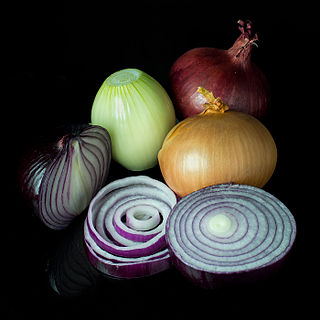
The onion, also known as the bulb onion or common onion, is a vegetable that is the most widely cultivated species of the genus Allium. Its close relatives include the garlic, scallion, shallot, leek, chive, and Chinese onion.

Scallions are vegetables derived from various species in the genus Allium. Scallions have a milder taste than most onions. Their close relatives include garlic, shallot, leek, chive, and Chinese onions.

Allium tuberosum is a species of plant native to the Chinese province of Shanxi, and cultivated and naturalized elsewhere in Asia and around the world.
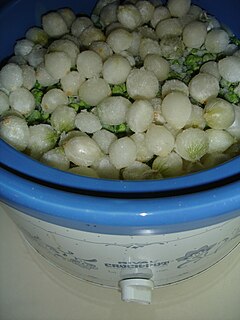
The pearl onion, also known as button, baby or silverskin onions in the UK, or creamers in the US, is a close relative of the leek, and may be distinguished from common onions by having only a single storage leaf, similar to cloves of garlic. In French they are known as oignon grelot. One English-speaking reference also mentions the term petit poireau antillais.

Allium nigrum, common name black garlic, broad-leaved leek, or broadleaf garlic, is a Middle Eastern species of wild onion. It lacks the onion or garlic scent shared by most of the other species in the group. The species is native to Turkey, Cyprus, Syria, Lebanon, and Israel but cultivated as an ornamental in many other places. It has become naturalized in some regions, including parts of the United States.

Allium cristophii, the Persian onion or star of Persia, is a species of flowering plant in the family Amaryllidaceae, native to Iran, Turkey, and Turkmenistan, though grown as an ornamental bulbous plant in many parts of the world. It may be sold under the synonym of Allium albopilosum.

Allium siculum, known as honey garlic, Sicilian honey lily, Sicilian honey garlic, or Mediterranean bells, is a European and Turkish species of plants genus Allium. It is native to the regions around the Mediterranean and Black Seas, and grown in other regions as an ornamental and as a culinary herb.
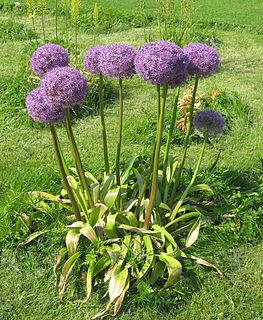
Allium hollandicum, the Persian onion or Dutch garlic, is a species of flowering plant native to Iran and Kyrgyzstan but widely cultivated as an ornamental because of its umbels of attractive purple flowers. It is reportedly naturalized in Saint Louis County, Minnesota.
Allium dumetorum is a Middle Eastern species of onion found in Israel, Palestine, Lebanon and Jordan. It is a bulb-forming perennial with a few pinkish flowers; ovary pale green.
Allium materculae is a species of onion native to Turkey, Iran, and Russia.

Allium akaka is a species of onion native to Iran.
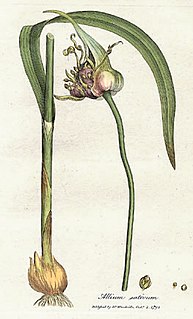
Allium is a genus of monocotyledonous flowering plants that includes hundreds of species, including the cultivated onion, garlic, scallion, shallot, leek, and chives. The generic name Allium is the Latin word for garlic, and the type species for the genus is Allium sativum which means "cultivated garlic".
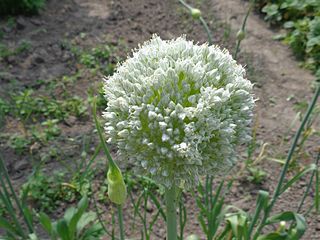
The precise taxonomy of the genus Allium is still poorly understood with incorrect descriptions being widespread. With over 850 species distributed over the Northern hemisphere Allium is the sole genus in the Allieae, one of four tribes of subfamily Allioideae (Amaryllidaceae). New species continue to be described and Allium is both highly variable and one of the largest monocotyledonous genera, but the precise taxonomy of Allium is poorly understood, with incorrect descriptions being widespread. The difficulties arise from the fact that the genus displays considerable polymorphism and has adapted to a wide variety of habitats. Furthermore, traditional classications had been based on homoplasious characteristics. However, the genus has been shown to be monophyletic, containing three major clades, although some proposed subgenera are not. Some progress is being made using molecular phylogenetic methods, and the internal transcribed spacer (ITS) region, including the 5.8S rDNA and the two spacers ITS1 and ITS2, is one of the more commonly used markers in the study of the differentiation of the Allium species.
Allium balkhanicum is a species of plant in the amaryllis family and is endemic to.
Allium bisotunense is a species of flowering plant in the family Amaryllidaceae and is endemic to Iran.
Allium graveolens is a species of plant in the amaryllis family and is native to Iran.
Allium kwakense is a species of plant in the amaryllis family and is native to Kyrgyzstan.
Allium subkopetdagense is a species of plant in the amaryllis family and is native to Turkmenistan.

Allium orientale is a species of wild garlic/onion native to the eastern Mediterranean; Libya, Egypt, Sinai, the Levant, Cyprus and Anatolia. It has high genetic variation but is not widely distributed, suggesting that it may contain cryptic species.











